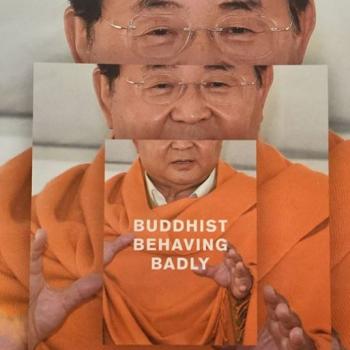
Today’s post will follow up from one last week: Would a Buddhist Affirm that belief in God is a Delusion? It also relates to a great post last year by a University of the West student at a blog set up for a course on Buddhism in America: I STILL DON’T KNOW: BUDDHISM AND GOD.
My sense is that a scholarly study of God/gods in the Pali Canon will find a sort of ambivalence on the part of the Buddha. Call it skillful means. The Buddha doesn’t reject God outright as far as I know(I’m using the term generically, but as we will see, in particular cases ‘God’ will need to be clearly defined), but clearly the idea of a creator God is abandoned and replaced with various notions of ‘lawfulness.’
Unfortunately the issue of definition is at the forefront here. Barbara O’Brien blogged about Buddhism and God last fall and one early, helpful comment comes from Sean Robsville, stating, “The Abrahamists themselves have different understandings of God. For example, the Quaker idea of the ‘Inner Light’, which has more resemblance to ‘Buddha Nature’ than to the violent tribal warlord of the Old Testament and Koran.” While it’s certainly unfair to call the God of the OT or Koran a “violent tribal warlord” in such sweeping terms, the point is good.
Barbara responds, “The Christian theologian Paul Tillich described God as the ground of being, which makes God out to be something like the Trikaya” [or, perhaps the Dharmakaya]. So there you go. Christians who are happy with Tillich’s theology and Buddhists who embrace the Trikaya doctrine clearly have some common ground for discussion and mutual appreciation.
Too often the discussion is dominated by those saying “Buddhism has no place for a creator God” vs those finding similarities like the one above between Quakers and the Buddha Nature doctrine. These are extremes. Both can be helpful starting points, but only if one is urged to look beyond them toward the other side. Just as Buddhist thought on the nature of ‘higher beings’ (such as apparent ‘savior bodhisattvas‘) evolved, so have Western monotheistic understandings of God.
We’ll look at the Pali Canon in the next post. But before we do, let’s recap. First, there is no simple yes/no answer regarding the Buddha (or Buddhism) and God. Starting with one is okay, as long as we then show the problems in it. For example:
“The Buddha didn’t endorse a creator God such as that found in general definitions of Western monotheism. However, in the Pali Canon there is found a complex pantheon of Brahmanic gods (and yakkhas) interacting with humans, including the Buddha. Furthermore, there are Western conceptions of God that do not include all of the connotations found in traditional definitions. Finally, as Buddhism evolved, certain traditions came to understand the Buddha himself and other supernormal beings (namely Bodhisattvas) in ways that further facilitate comparison with Western understandings of God.”
While my interest keeps me in the Pali Canon and comparing only certain Western understandings of God, I encourage people with Tibetan or East Asian interests to conduct or search out their own comparisons. For those with access to the Journal of Buddhist-Christian Studies, thumb through their table of contents for many useful studies. For everyone, try the (free online) Journal of Interreligious Dialogue. If you do write something, please feel free to leave me a link in the comments below.
For now, much metta, and may God be with you. (links to future parts as they are written)











